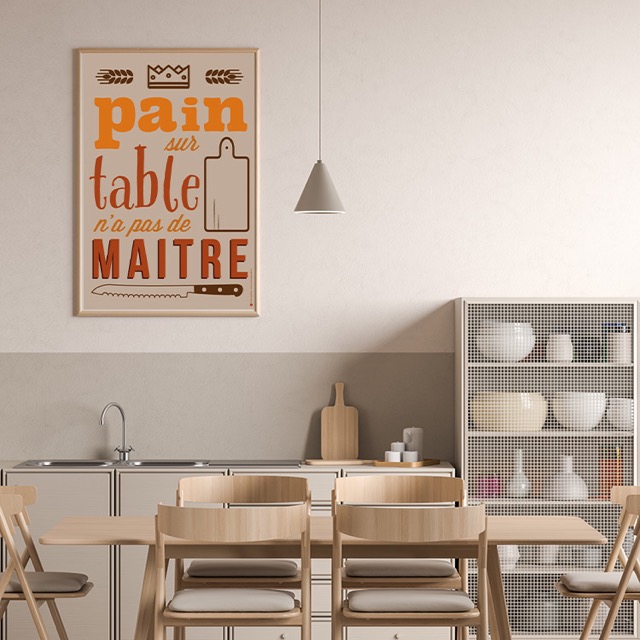Bread on the table has no master: a French expression
Updated at Mar 24, 2024

In the French collective imagination, bread holds a special place. More than just food, it is the cement of conviviality, a symbol of sharing that transcends ages and social classes. It is both everyday and sacred, simple and essential. It is in this context that the expression "Bread on the table has no master" emerges, a phrase that goes far beyond food to touch on the fundamental values of equality and fraternity.
Bread in French Culture
France and bread have an ancestral relationship. The baguette, for example, is not just a bakery product but a nationally recognized symbol worldwide. Bread is present in every home, on every table, and at every occasion. It accompanies meals, from the humblest to the most festive, and its place is always honored. It is a cultural heritage, a French way of life.
Origin of the Expression
The expression "Bread on the table has no master" finds its roots in a time when bread was the main element of the diet. In rural communities, sharing bread was an act that reinforced solidarity and cohesion. It is said that when bread is placed on the table, it belongs to no one and is offered to all. No one can claim exclusive rights to this common good; it transcends hierarchies and personal possessions.
Bread, Symbol of Equality
In this phrase, bread is a vector of equality. At the table, all are equal in its presence. It is a tradition that persists even in restaurants where bread is often served for free, presupposing that access to this basic should be universal. This vision aligns with the republican ideal of France, where liberty, equality, and fraternity are the cornerstones of society.
Societal Resonance
The bread on the table can be perceived as a metaphor for access to basic needs. In a contemporary reading, the expression challenges social justice and equity in access to resources. It invites reflection on inequalities and the role of each in building a world where fundamental rights are respected and shared.
Bread and Conviviality
Sharing bread is intrinsically linked to the notion of conviviality. In bakeries, markets, and around tables, bread stimulates interactions, fosters exchanges, and encourages meetings. It is often the first food offered, an outstretched hand to another, an invitation to conversation and sharing experiences.
Bread, Between Tradition and Modernity
The attachment to bread and its values continues, even in an era where eating habits are diversifying. Artisan bakeries are experiencing a revival, valuing traditional methods and the use of ancient wheat varieties. Bread is at the heart of a movement that demands impeccable quality, respect for the environment, and the preservation of gastronomic heritage.
Bread in Art and Literature
The expression also resonates in art and literature, where bread is frequently used as a motif representing humility, generosity, or daily life. Many works feature bread to express these concepts, whether in painting, poetry, or cinema.
Bread and Education
"Bread on the table has no master" also serves as a life lesson, a principle to teach the younger generations about the importance of sharing resources equitably. In schools, this maxim can be integrated into civic education, used to teach respect for others and the value of solidarity. It can inspire actions like shared meals and food distributions to the less fortunate, thus strengthening social bonds and community awareness.
Gastronomy and the Social Dimension of Bread
French gastronomy, renowned for its excellence, does not neglect bread, which accompanies and enhances the most refined dishes. But beyond its gustatory function, bread in gastronomy also recalls its social dimension. Great chefs are often the first to remind us that the quality of simple ingredients is the basis of great cuisine, and bread perfectly illustrates this philosophy.
Economic and Local Impact of Bread
The expression also highlights the economic and local impact of bread. Bakeries are essential places of life in villages and cities, contributing to the local economy and employment. Choosing locally made bread supports the local economy and promotes a sustainable consumption model.
Bread in the Global Context
Bread, in its simplicity, is universal. The notion that "bread on the table has no master" finds echoes in many cultures, all of which have a version of this staple food. It reminds us that despite our differences, some experiences are shared worldwide and can serve as bridges between peoples.
"Bread on the table has no master" is much more than a picturesque expression; it is a philosophy of life. It teaches us equality, sharing, and invites us to reflect on our relationship with others and our environment. Bread, in its most humble form, becomes a powerful symbol of unity and fraternity. Its constant presence in our daily lives is a reminder of what we have in common, of what nourishes us both physically and spiritually.
Through time, bread has witnessed history, nourished generations, and inspired artists and thinkers. This French expression sums up a popular wisdom that, hopefully, will continue to be passed on, reminding everyone of the importance of these values that are the very foundation of social cohesion.





